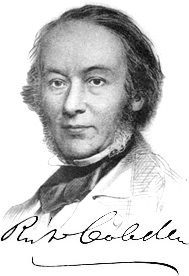Richard Cobden
| Richard Cobden | |
|---|---|

Richard Cobden
|
|
| Born |
3 June 1804 Dunford, Heyshott, Sussex, England, United Kingdom |
| Died | 2 April 1865 (aged 60) Suffolk Street, Westminster, London, England, United Kingdom |
| Cause of death | Asthma and bronchitis |
| Resting place | West Lavington, Sussex |
| Known for | Member of the Anti-Corn Law League and peace campaigner |
| Home town | Midhurst, Sussex |
| Political party | Independent Radical, Liberal |
Richard Cobden (3 June 1804 – 2 April 1865) was an English manufacturer and Radical and Liberal , associated with two major free trade campaigns, the Anti-Corn Law League and the Cobden–Chevalier Treaty.
As a young man, Cobden was a successful commercial traveller who became co-owner of a highly profitable calico printing factory in Manchester, a city with which he would become strongly identified. However, he soon found himself more engaged in politics, and his travels convinced him of the virtues of free trade (anti-protection) as the key to better international relations.
In 1838, he and John Bright founded the Anti-Corn Law League, aimed at abolishing the unpopular Corn Laws, which protected landowners’ interests by levying taxes on imported wheat, thus raising the price of bread. As a Member of Parliament from 1841, he fought against opposition from the Peel ministry, and abolition was achieved in 1846.
Another free trade initiative was the Cobden-Chevalier Treaty of 1860, promoting closer interdependence between Britain and France. This campaign was conducted in collaboration with John Bright and French economist Michel Chevalier, and succeeded despite Parliament’s endemic mistrust of the French.
Cobden was born at a farmhouse called Dunford, in Heyshott near Midhurst, in Sussex. He was the fourth of eleven children born to William Cobden and his wife Millicent (née Amber). His family had been resident in that neighbourhood for many generations, occupied partly in trade and partly in agriculture. His grandfather Richard Cobden owned Bex Mill in Heyshott and was an energetic and prosperous maltster who served as bailiff and chief magistrate at Midhurst and took rather a notable part in county matters. His father William however forsook malting in favour of farming, taking over the running of Dunford Farm when Richard died in 1809. A poor business man, he sold the property when the farm failed and moved the family to a smaller farm at nearby Gullard’s Oak. Conditions did not improve and by 1814, after several more moves, the family eventually settled as tenant farmers in West Meon, near Alton in Hampshire.
...
Wikipedia
